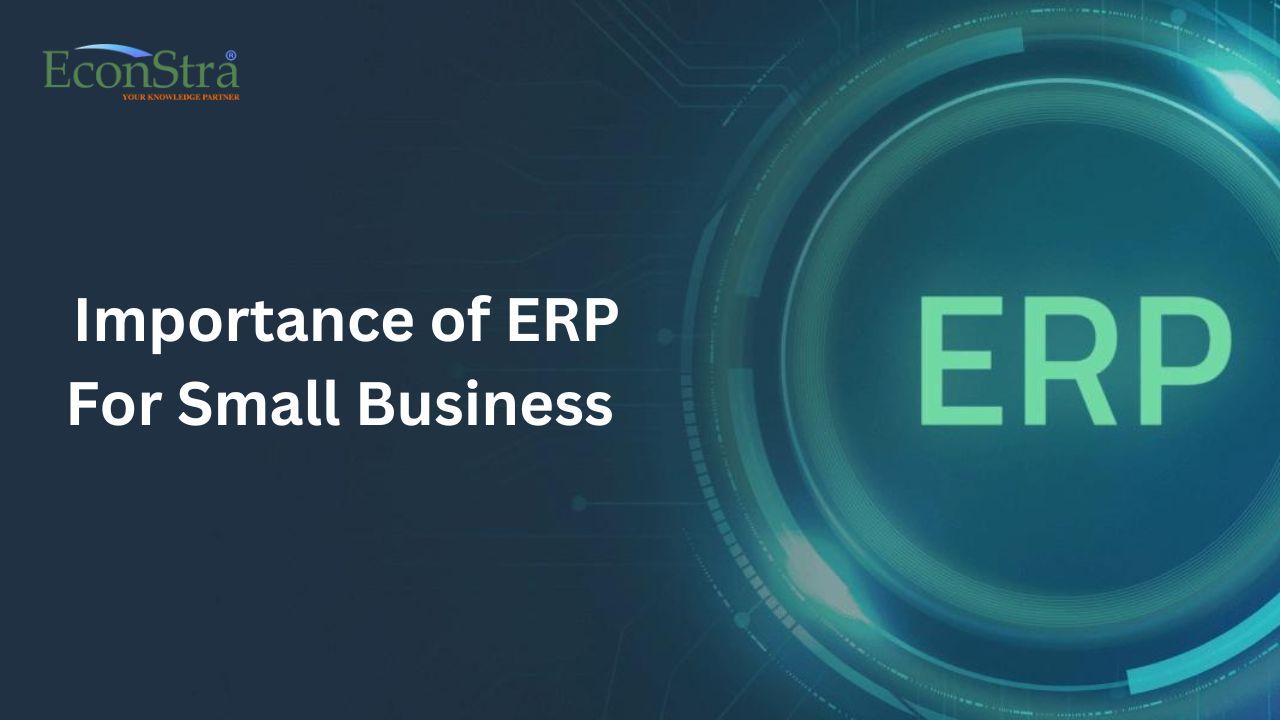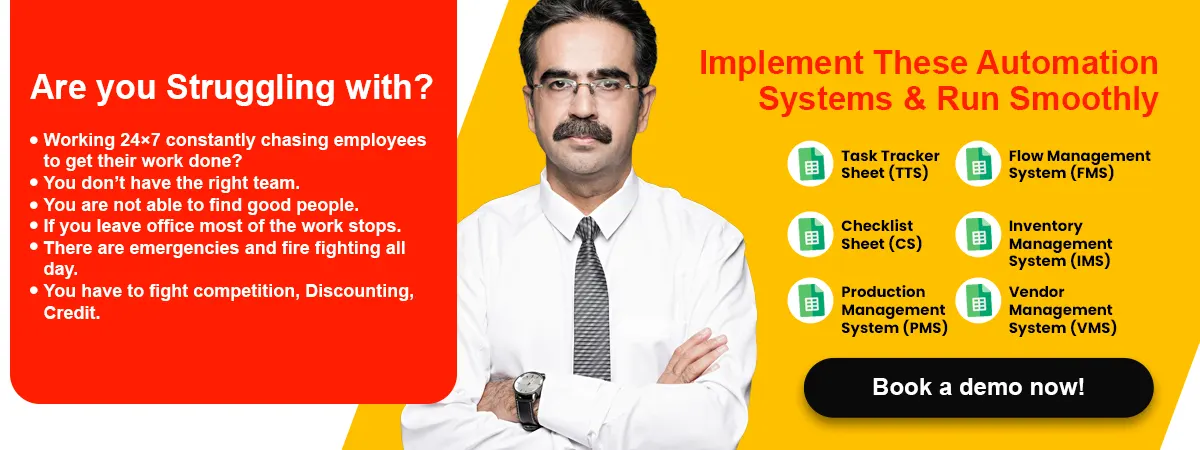by Subhadeep Chowdhury
Share

In the fast-paced world of business, small enterprises often find themselves juggling multiple tasks and responsibilities to keep their operations running smoothly. This constant struggle for efficiency and profitability can become overwhelming without the right tools in place.
Enter Enterprise Resource Planning (ERP) systems, a game-changer for small businesses aiming to streamline their operations and achieve sustainable growth.
ERP systems are powerful, integrated software solutions designed to manage and automate various aspects of a business, from financials and inventory management to human resources and customer relations. While they were once considered the exclusive domain of large corporations, ERP systems are now more accessible than ever, offering small businesses the opportunity to compete effectively in today’s competitive landscape.
So, today, in this blog post, we will delve into the significance of ERP systems for small businesses. We will explore how ERP can enhance efficiency, facilitate decision-making, improve customer satisfaction, and ultimately drive the success of small enterprises.
Also read: What Is Enterprise Resource Planning
The Importance of Enterprise Resource Planning for Small Businesses
-
Enhanced Efficiency:
Small businesses often operate with limited resources, and manual processes can be time-consuming and error-prone. This inefficiency can hinder growth and profitability. ERP systems streamline operations by automating routine tasks such as data entry, order processing, and inventory management. This automation not only reduces the risk of human error but also frees up valuable time and resources.
With all critical business functions integrated into one system, employees can access real-time data, allowing for better decision-making and improved collaboration. For example, when a customer places an order, an ERP system can update inventory levels, trigger the production of additional units, and schedule delivery—all without manual intervention. This level of automation ensures that small businesses can fulfill orders promptly and accurately, leading to higher customer satisfaction.
-
Informed Decision-Making:
Small business owners often wear multiple hats and must make important decisions daily. Without access to accurate and up-to-date information, these decisions can be challenging and risky. ERP systems provide a centralized repository for all business data, making it easier for owners and managers to access the information they need when they need it.
ERP dashboards and reporting tools allow users to generate customized reports, analyze key performance indicators, and track trends over time. This data-driven approach empowers small business leaders to make informed decisions about everything from inventory management and pricing strategies to marketing campaigns and hiring. By having a clear view of their business’s financial health and performance metrics, small businesses can adapt and thrive in a constantly changing market.
-
Improved Customer Satisfaction:
Small businesses rely heavily on their ability to build strong relationships with customers. An ERP system can play a pivotal role in this regard. By centralizing customer data, order history, and communication records, businesses can provide more personalized and efficient service. When a customer contacts the business, employees can quickly access their information, preferences, and previous interactions, allowing for a more tailored and satisfying customer experience.
Additionally, ERP systems can automate order tracking and provide customers with real-time updates on the status of their orders. This transparency enhances trust and satisfaction, as customers appreciate knowing when to expect their purchases. Moreover, by improving order accuracy and delivery times, ERP systems help prevent costly mistakes and reduce the likelihood of customer complaints.
Also read: What Does Enterprise Resource Planning Involve?
-
Scalability and Growth:
One of the most significant advantages of ERP systems is their scalability. Small businesses may start with basic ERP modules to meet their immediate needs and budget constraints. As they grow and expand, they can easily add more functionalities to their ERP system, such as CRM (Customer Relationship Management) or E-commerce integration.
This scalability enables small businesses to adapt to changing market conditions and seize new opportunities without the need for a complete system overhaul. Whether opening new locations, expanding product lines, or entering new markets, an ERP system can flexibly accommodate the evolving needs of the business. As a result, small enterprises can achieve sustainable growth without being limited by their software capabilities.
-
Cost Savings:
Cost management is a top priority for small businesses and ERP systems can contribute significantly to reducing operational expenses. By automating processes, businesses can decrease labor costs associated with manual data entry, order processing, and inventory management. Moreover, ERP systems provide insights into cost control and efficiency optimization opportunities.
For instance, with real-time visibility into inventory levels, businesses can reduce excess stock and minimize carrying costs. Additionally, accurate demand forecasting tools within ERP systems help businesses order just the right amount of inventory, preventing overstocking or stockouts. These cost-saving measures can have a substantial impact on a small business’s bottom line, improving profitability and financial stability.
Challenges of Implementing ERP in Small Businesses
Implementing Enterprise Resource Planning (ERP) systems in small businesses can bring numerous benefits, but it is not without its challenges. In this section, we will explore the key challenges that small businesses often face when embarking on an ERP implementation journey.
A. Initial Cost and Resource Allocation:
One of the primary challenges for small businesses when implementing an ERP system is the initial cost and resource allocation required. ERP systems can be expensive to purchase, customize, and integrate into existing processes. Small businesses often have limited financial resources, and the upfront investment can be a significant burden. This challenge extends beyond just the cost of the software itself; it also includes expenses related to hardware, training, consultancy, and ongoing maintenance.
To address this challenge, small businesses need to carefully budget for ERP implementation, explore cost-effective options, and consider the long-term return on investment (ROI) that ERP can offer in terms of efficiency gains and cost savings.
Also read: Overcoming Common Challenges Of ERP Implementation
B. Resistance to Change Within the Organization:
Resistance to change is a common issue during ERP implementation, and it can be particularly pronounced in small businesses where employees might wear multiple hats and have deep-rooted processes. Employees may resist the new ERP system due to fear of job displacement, the perception of increased workload during the transition, or simply a resistance to learning new technologies and processes.
To mitigate this challenge, it is crucial for small businesses to foster a culture of change readiness. Communication, training, and involvement of employees in the ERP implementation process can help reduce resistance and create a sense of ownership among staff.
C. Selecting the Right ERP Solution:
Small businesses often struggle with selecting the right ERP solution that aligns with their unique needs and budget constraints. The ERP market offers a plethora of options, making it challenging to identify the most suitable system. A wrong choice can lead to inefficiencies, wasted resources, and even project failure.
To address this challenge, small businesses should conduct a thorough needs assessment, involve key stakeholders in the selection process, and seek expert advice when necessary. It is essential to evaluate ERP solutions not only based on their current requirements but also their scalability to accommodate future growth.
Successful ERP Implementation Strategies for Small Businesses
Implementing an Enterprise Resource Planning (ERP) system in a small business can be a complex endeavor, but success can be achieved by following effective implementation strategies. In this section, we will explore four key strategies for the successful implementation of ERP in small businesses.
A. Planning and goal-setting:
Successful ERP implementation begins with meticulous planning and goal-setting. Small businesses should start by defining clear objectives and outcomes they aim to achieve with the ERP system. These objectives could include improving operational efficiency, enhancing data accuracy, or streamlining processes. Setting realistic and measurable goals ensures that the ERP project remains focused and aligned with the organization’s strategic vision. Moreover, a well-defined project plan with timelines, milestones, and responsibilities is essential. Planning should also encompass risk assessment and mitigation strategies to address potential challenges that may arise during the implementation process.
B. Involving key stakeholders:
Involving key stakeholders is critical to the success of an ERP implementation. These stakeholders include not only top management but also employees who will use the system daily. Small businesses should foster a collaborative approach by actively engaging stakeholders in the decision-making process. By involving employees from different departments, businesses can gather valuable insights into specific needs and challenges. This engagement not only helps in selecting the most suitable ERP solution but also generates buy-in from employees, reducing resistance to change. Regular communication with stakeholders throughout the implementation process is essential to keep everyone informed and engaged.
C. Employee training and support:
Employee training and support are integral components of a successful ERP implementation. Small businesses should invest in comprehensive training programs to ensure that staff members are proficient in using the new system. Training should be tailored to different roles within the organization, and it should be ongoing to address evolving needs. Providing adequate support during and after implementation is crucial to help employees adapt to the new system and resolve any issues or questions they may have. This support can come in the form of dedicated help desks, user manuals, and access to experts who can provide guidance.
D. Regular evaluation and adjustment:
ERP implementation is not a one-time event; it is an ongoing process that requires continuous evaluation and adjustment. Small businesses should establish mechanisms for monitoring the system’s performance and its impact on business operations. Regularly assessing key performance indicators (KPIs) and soliciting feedback from users can help identify areas for improvement. If issues or bottlenecks arise, the organization should be prepared to make necessary adjustments to the system configuration or processes. Flexibility and adaptability are key to ensuring that the ERP system continues to meet the changing needs of the business.
NOTE:
In the realm of small businesses, the importance of Enterprise Resource Planning (ERP) cannot be overstated, and Econstra stands at the forefront of providing tailored solutions for optimal business automation. In an increasingly fast-paced and competitive market, Econstra’s Business SYSTEMS offers small business owners a transformative tool to enhance operational efficiency, streamline processes, and foster informed decision-making. This article delves into the indispensable role of ERP in the success of small enterprises and highlights how Econstra’s expertise in delivering comprehensive ERP solutions aligns seamlessly with the unique needs of each business. As businesses strive to navigate the complexities of today’s economic landscape, Econstra emerges not just as a business consultant but as a strategic partner, enabling small businesses to harness the power of ERP for sustainable growth and heightened competitiveness.
The Bottom Line: Importance of Enterprise Resource Planning for Small Businesses
In conclusion, Enterprise Resource Planning (ERP) systems are no longer reserved for large corporations; they have become indispensable tools for small businesses aiming to thrive in today’s competitive landscape. ERP systems offer a multitude of benefits, including enhanced efficiency through automation, informed decision-making with real-time data, improved customer satisfaction through personalized service, scalability to accommodate growth, and significant cost savings.
Small businesses that embrace ERP systems gain a competitive edge by streamlining their operations, reducing errors, and fostering better customer relationships. With ERP systems, small enterprises can not only survive but also thrive, positioning themselves for long-term success.
As technology continues to advance and ERP solutions become more accessible, the importance of ERP for small businesses will only continue to grow, making it a wise investment for those looking to build a sustainable and prosperous future. Don’t let your small business miss out on the advantages ERP systems can offer.
STAY IN THE LOOP
Subscribe to our free newsletter.
Business consultant services provide the strategic insight and expertise necessary to steer your company through various challenges and opportunities. These professionals play a crucial role in helping businesses identify growth opportunities, optimize operations, and achieve long-term success. Understanding the Role of a Business Consultant A business consultant acts as an external advisor who brings a […]
In today’s competitive business landscape, companies are constantly seeking ways to reduce operational costs while maintaining or improving efficiency and customer satisfaction. Customer Relationship Management (CRM) systems have emerged as vital tools that enable businesses to achieve these goals. As a leading business consultancy, Econstra understands the importance of leveraging CRM technology to streamline operations, […]
Why Operational Costs Are Draining Your Profits? Operational costs are a critical aspect of running a successful business, but when not managed properly, they can drain your profits and stifle growth. In a competitive market, maintaining profitability requires keen oversight of expenses and strategic planning. Econstra, as a leading business consultancy, provides insights and strategies […]
In the rapidly advancing digital landscape, Artificial Intelligence (AI) tools have emerged as transformative assets for businesses. Their potential to enhance efficiency, streamline operations, and drive innovation makes them invaluable for business consultants and organizations worldwide. For business consultants in India, AI’s strategic application can be particularly advantageous in navigating a diverse and dynamic market. […]





